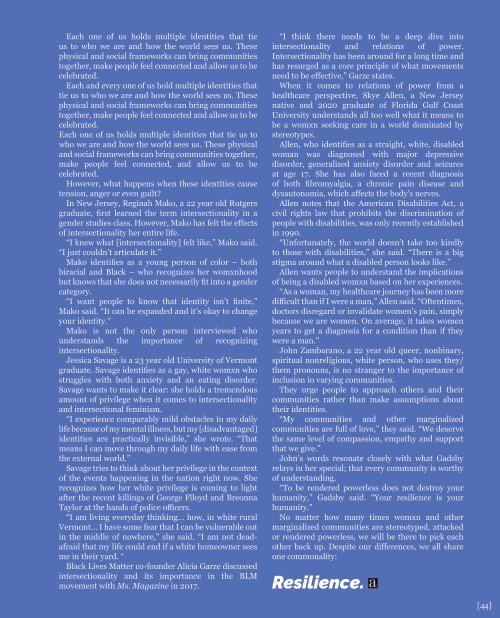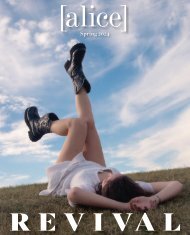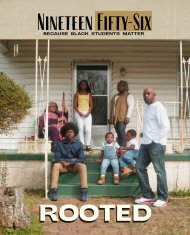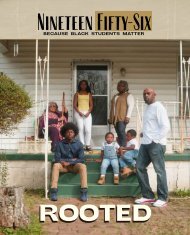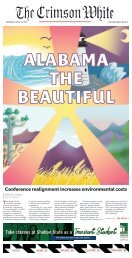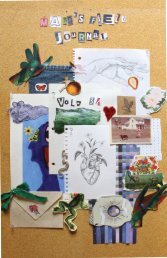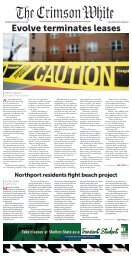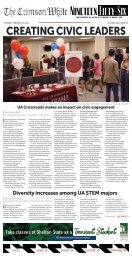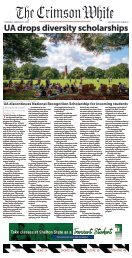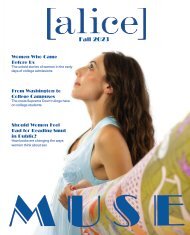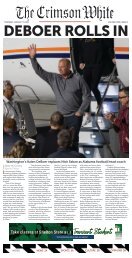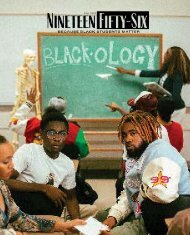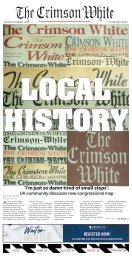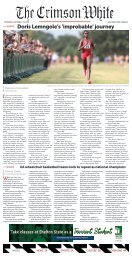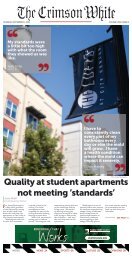Alice Vol. 6 No. 1
Published by UA Student Media Summer 2020.
Published by UA Student Media Summer 2020.
You also want an ePaper? Increase the reach of your titles
YUMPU automatically turns print PDFs into web optimized ePapers that Google loves.
Each one of us holds multiple identities that tie<br />
us to who we are and how the world sees us. These<br />
physical and social frameworks can bring communities<br />
together, make people feel connected and allow us to be<br />
celebrated.<br />
Each and every one of us hold multiple identities that<br />
tie us to who we are and how the world sees us. These<br />
physical and social frameworks can bring communities<br />
together, make people feel connected and allow us to be<br />
celebrated.<br />
Each one of us holds multiple identities that tie us to<br />
who we are and how the world sees us. These physical<br />
and social frameworks can bring communities together,<br />
make people feel connected, and allow us to be<br />
celebrated.<br />
However, what happens when these identities cause<br />
tension, anger or even guilt?<br />
In New Jersey, Reginah Mako, a 22 year old Rutgers<br />
graduate, first learned the term intersectionality in a<br />
gender studies class. However, Mako has felt the effects<br />
of intersectionality her entire life.<br />
“I knew what [intersectionality] felt like,” Mako said.<br />
“I just couldn’t articulate it.”<br />
Mako identifies as a young person of color – both<br />
biracial and Black – who recognizes her womxnhood<br />
but knows that she does not necessarily fit into a gender<br />
category.<br />
“I want people to know that identity isn’t finite,”<br />
Mako said. “It can be expanded and it’s okay to change<br />
your identity.”<br />
Mako is not the only person interviewed who<br />
understands the importance of recognizing<br />
intersectionality.<br />
Jessica Savage is a 23 year old University of Vermont<br />
graduate. Savage identifies as a gay, white womxn who<br />
struggles with both anxiety and an eating disorder.<br />
Savage wants to make it clear: she holds a tremendous<br />
amount of privilege when it comes to intersectionality<br />
and intersectional feminism.<br />
“I experience comparably mild obstacles in my daily<br />
life because of my mental illness, but my [disadvantaged]<br />
identities are practically invisible,” she wrote. “That<br />
means I can move through my daily life with ease from<br />
the external world.”<br />
Savage tries to think about her privilege in the context<br />
of the events happening in the nation right now. She<br />
recognizes how her white privilege is coming to light<br />
after the recent killings of George Flloyd and Breonna<br />
Taylor at the hands of police officers.<br />
“I am living everyday thinking… how, in white rural<br />
Vermont... I have some fear that I can be vulnerable out<br />
in the middle of nowhere,” she said. “I am not deadafraid<br />
that my life could end if a white homeowner sees<br />
me in their yard. “<br />
Black Lives Matter co-founder Alicia Garze discussed<br />
intersectionality and its importance in the BLM<br />
movement with Ms. Magazine in 2017.<br />
“I think there needs to be a deep dive into<br />
intersectionality and relations of power.<br />
Intersectionality has been around for a long time and<br />
has resurged as a core principle of what movements<br />
need to be effective,” Garze states.<br />
When it comes to relations of power from a<br />
healthcare perspective, Skye Allen, a New Jersey<br />
native and 2020 graduate of Florida Gulf Coast<br />
University understands all too well what it means to<br />
be a womxn seeking care in a world dominated by<br />
stereotypes.<br />
Allen, who identifies as a straight, white, disabled<br />
woman was diagnosed with major depressive<br />
disorder, generalized anxiety disorder and seizures<br />
at age 17. She has also faced a recent diagnosis<br />
of both fibromyalgia, a chronic pain disease and<br />
dysautonomia, which affects the body’s nerves.<br />
Allen notes that the American Disabilities Act, a<br />
civil rights law that prohibits the discrimination of<br />
people with disabilities, was only recently established<br />
in 1990.<br />
“Unfortunately, the world doesn’t take too kindly<br />
to those with disabilities,” she said. “There is a big<br />
stigma around what a disabled person looks like.”<br />
Allen wants people to understand the implications<br />
of being a disabled womxn based on her experiences.<br />
“As a woman, my healthcare journey has been more<br />
difficult than if I were a man,” Allen said. “Oftentimes,<br />
doctors disregard or invalidate women’s pain, simply<br />
because we are women. On average, it takes women<br />
years to get a diagnosis for a condition than if they<br />
were a man.”<br />
John Zambarano, a 22 year old queer, nonbinary,<br />
spiritual nonreligious, white person, who uses they/<br />
them pronouns, is no stranger to the importance of<br />
inclusion in varying communities.<br />
They urge people to approach others and their<br />
communities rather than make assumptions about<br />
their identities.<br />
“My communities and other marginalized<br />
communities are full of love,” they said. “We deserve<br />
the same level of compassion, empathy and support<br />
that we give.”<br />
John’s words resonate closely with what Gadsby<br />
relays in her special; that every community is worthy<br />
of understanding.<br />
“To be rendered powerless does not destroy your<br />
humanity,” Gadsby said. “Your resilience is your<br />
humanity.”<br />
<strong>No</strong> matter how many times womxn and other<br />
marginalized communities are stereotyped, attacked<br />
or rendered powerless, we will be there to pick each<br />
other back up. Despite our differences, we all share<br />
one commonality:<br />
Resilience.<br />
[ 44 ]


